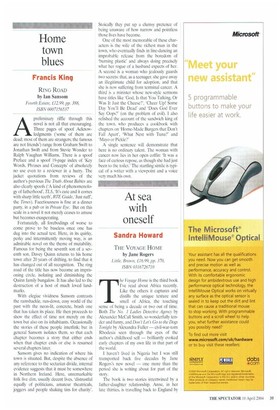Home town blues
Francis King
RING ROAD by Ian Sansom Fourth Estate, £12.99, pp. 388, ISBN 0007156537 Apreliminary riffle through this novel is not all that encouraging. Three pages of spoof Acknowledgments ('some of them are dead; most of them are strangers; the famous are not friends') range from Graham Swift to Jonathan Swift and from Stevie Wonder to Ralph Vaughan Williams. There is a spoof Preface and a spoof 19-page index of 'Key Words, Phrases and Concepts' of absolutely no use even to a reviewer in a hurry. The jacket quotations from reviews of the author's previous The DTA About Babies are also clearly spoofs CA kind of phenomenology of fatherhood', TLS, `Ifs cute and it comes with sharp little teeth', RTE Guide, 'Just naff, the Times). Facetiousness is fine at a dinner party, in a pub or in Private Eye. But on this scale in a novel it not merely ceases to amuse but becomes exasperating.
Fortunately, all forebodings of worse to come prove to be baseless once one has dug into the actual text. Here, in its quirky, perky and intermittently moving way, is an admirable novel on the theme of mutability. Famous for being the seventh son of a seventh son, Davey Quinn returns to his home town after 20 years of drifting, to find that it has changed out of all recognition. The ring road of the title has now become an imprisoning circle, isolating and diminishing the Quinn family bungalow. It has also led to the destruction of a host of much loved landmarks.
With elegiac vividness Sansom contrasts the ramshackle, run-down, cosy world of the past with the neon-lit, concrete, brash one that has taken its place. He then proceeds to show the effect of time not merely on the town but also on its inhabitants. Occasionally the stories of these people interlink: but in general Sansom isolates them, so that each chapter becomes a story that either ends when that chapter ends or else is resumed several chapters later.
Sansom gives no indication of where his town is situated. But, despite the absence of any reference to the sectarian divide, internal evidence suggests that it must be somewhere in Northern Ireland. Here, unremarkable folk live dim, usually decent lives, 'distrustful equally of politicians, amateur theatricals, joggers and people shaking tins for charity'. Stoically they put up a clumsy pretence of being unaware of how narrow and pointless those lives have become.
One of the most memorable of these characters is the wife of the richest man in the town, who eventually finds in line-dancing an improbable release from the boredom of 'burning plastic' and always doing precisely what her rogue of a husband expects of her. A second is a woman who jealously guards two secrets: that, as a teenager, she gave away an illegitimate child for adoption, and that she is now suffering from terminal cancer. A third is a minister whose new-style sermons have titles like 'God, Is that You Talking, Or Was It Just the Cheese?'. 'Cheer Up! Some Day You'll Be Dead' and 'Does God Ever Say Cops?' (on the problem of evil). I also relished the account of the sandwich king of the town. who produces a cookbook with chapters on 'Home-Made Burgers that Don't Fail Apart', 'What Next with Tuna?' and 'Mayo or Pickle?'
A single sentence will demonstrate that here is no ordinary talent. The woman with cancer now lies in her open coffin: 'It was a face of curious repose, as though she had just been to the toilet.' The startling simile is typical of a writer with a viewpoint and a voice very much his own.


































































 Previous page
Previous page